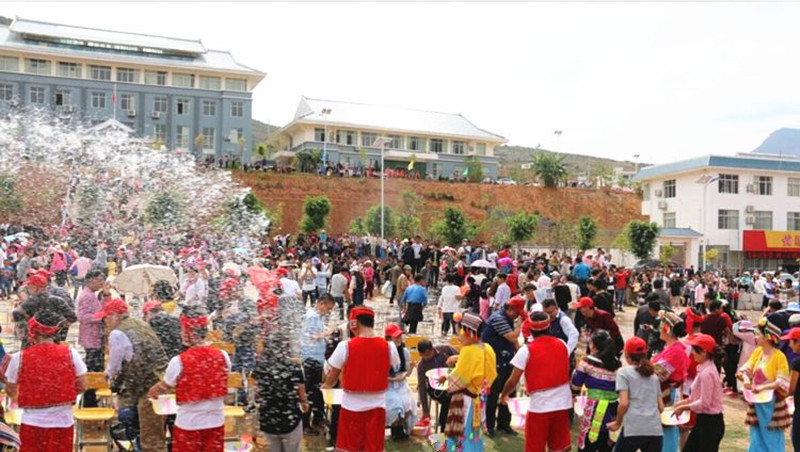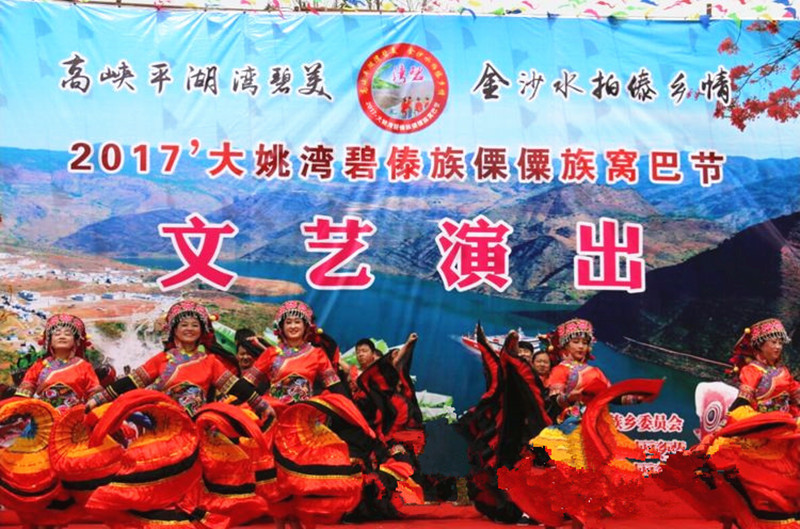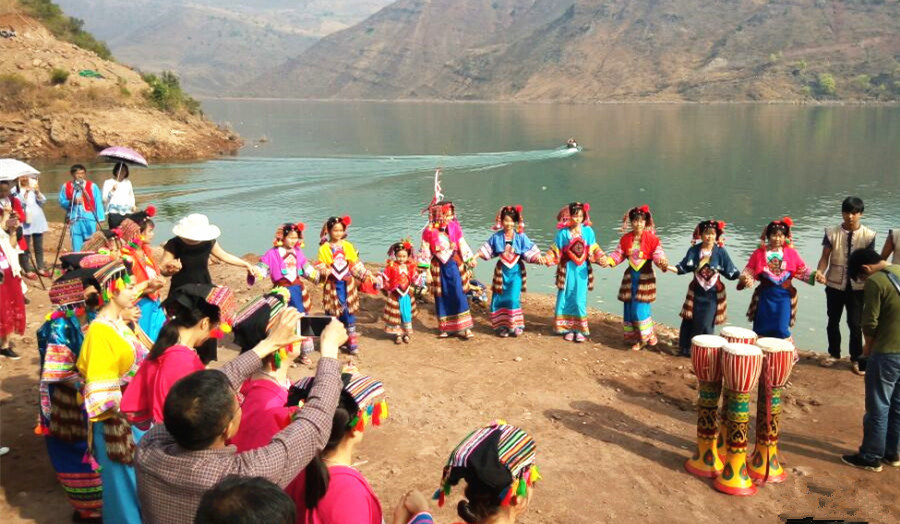
Woba Festival of Dai Ethnic Minority in Dayao County, Chuxiong
Basic Introduction
- Chinese Name: 大姚县湾碧傣族傈僳族乡傣族窝巴节/泼水节
- English Name: Woba Festival of Dai Ethnic Minority in Dayao County, Chuxiong
- Location:大姚县湾碧傣族傈僳族乡/Wanbi Dai and Lisu Ethnic Township, Dayao County
Wanbi Dai and Lisu Nationality Township in Dayao County is known as the ‘Little Banna of Yizhou’ and is said to be the hometown of the legendary ‘Qing Ge’ and ‘Hong Mei.’ The annual Wanbi Jinsha Dai Ethnic Traditional Festival, known as the ‘Woba Festival,’ has become a grand stage for ethnic integration and external exchange, attracting countless tourists, scholars, and experts.

‘Woba’ in the Dai language means a gathering of fish and signifies the calling of souls for all living things. The original intent of the ‘Woba Festival’ is to pray for a bountiful fishery and wish happiness and good fortune for the Dai people and all ethnic groups. Every year on the seventh day of the first lunar month, Dai people of all ages living on both banks of the Gaopingzi River dress in vibrant ethnic attire, carrying delicious food and wine, and gather by the Jinsha River to celebrate their festival.
The ‘Woba Festival’ is primarily focused on honoring the fish deity and consists of three stages: honoring the fish deity on the sixth day, inviting the fish deity on the seventh day, and welcoming the fish deity. Under the guidance of the Dai elders, various rituals are conducted with reverence, including chicken sacrifices, setting out offerings, calling of souls, and singing ritual songs.
On the sixth day, they honor the fish deity. This is the day when the fish gather with the fish deity, as the next day the fish deity will be invited back to the deep pool under Baishi Rock, to be welcomed into the homes of the Dai people. On this day, fish in the Jinsha River come together in pairs at the entrance of the Gaopingzi River, where Dai people residing on both banks joyfully gather by the Jinsha River to celebrate the beautiful evening together with the fish deity.
On the seventh day, the fish deity is invited and welcomed. During the blessings of the Dai elders, the Dai people will invite the ‘fish deity’ back home, bestowing blessings and good fortune upon the Dai community. They carve two fish from fine wood, wrapping them in red cloth or tying them with red thread, and place the wooden fish into the river. After circling the Jinsha River three times, seven handsome Dai youths lead the wooden fish, while seven beautiful Dai maidens carry precious gourds, walking upstream along the Gaopingzi River, singing as they go, until they reach the deep pool under Baishi Rock in Gaopingzi Village. As they pass through each village, the villagers gather by the river to bless each other by sprinkling holy water, join hands to perform a three-circle ‘Magpie Bathing Dance’ to pray for good fortune. When the Dai youths bring the wooden fish to Gaopingzi and secure it at the fish nest in the deep pool under Baishi Rock, the celebration reaches its climax

The Legends of Woba Festival
A long time ago, the ancestor of the Dai people, King Luba, unfortunately lost his life in a battle while resisting foreign invasion. The prince, Qing Ge, and the princess, Hong Mei, continued to lead the Dai people in a fierce fight against the enemy. To protect the Dai people, the prince and princess led the villagers on a long journey, traveling upstream along the Jinsha River until they reached the mouth of the Gaopingzi River. There, they encountered a sudden rise in the river’s water, making it impossible to continue upstream, forcing them to divert their course and come to a place surrounded by steep cliffs, known as “Bian Gui Cave,” where it was difficult for people to pass.
In a bid to eliminate the Dai people entirely, the enemy colluded with the mountain demons and water spirits in “Bian Gui Cave” to harm the Dai people. The prince and princess led the Dai people in battles against the enemies and various ghosts until they finally defeated all the enemies and spirits by the deep pool beneath the Great White Rock. The prince and princess were severely injured and jumped into the deep pool together.
The grieving Dai people cried out for Qing Ge and Hong Mei by the pool, hoping for their return. On the seventh day, though they did not see the prince and princess, they noticed many fish in the river, including a very large blue fish and a red fish, which often surfaced and seemed to nod at the people. The Dai people believed that these fish were the prince and princess. In order to be with the prince and princess, the children of the Dai people began to cultivate and settle along the banks of the Gaopingzi River and the Jinsha River.
In the past, due to the rapid currents of the Gaopingzi River, floods occurred every year, washing away fish, crops, livestock, and various plants and animals. Therefore, every year on the seventh day of the first lunar month, the day when Qing Ge and Hong Mei fell into the river, the respected elders of the village would lead the entire village to the Jinsha River to call back the souls of Qing Ge and Hong Mei. The Dai people believed that only by calling back the souls of all things washed away by the water to their rightful places and receiving them in their homes would the village enjoy a bountiful harvest, prosperous livestock, good health for everyone, and safety for all families.
In the Jinsha River basin, where agriculture is the mainstay, the Woba Festival reflects the hardworking, brave, simple, and kind nature of the Dai people, as well as their love for life and their courage and determination to actively fight against nature. As a result, this grand folk activity has been passed down from generation to generation.

The local Activities
- Water Splashing Ceremony: One of the most iconic features of the Woba Festival is the water splashing tradition. Participants pour and splash water on each other as a way to wash away bad luck and welcome blessings for the coming year. This practice symbolizes purification and is a joyous expression of community spirit.
- Puja Ceremony: The festival typically begins with a puja (prayer), where local Buddhist monks conduct rituals to bless the community and the people. This includes offerings and chanting, which are essential to expressing gratitude and invoking good fortune.
- Traditional Music and Dance: The festival features performances of traditional Dai music and dance, showcasing the rich cultural heritage of the Dai people. Groups often perform folk dances in vibrant costumes, accompanied by traditional instruments like drums and flutes.
- Culinary Activities: Local communities prepare and share traditional Dai dishes during the festival. This includes rice, various vegetable dishes, and other local specialties, often enjoyed in a communal setting to foster togetherness.
- Cultural Games and Competitions: Various games and competitions are held during the festival, including traditional sports and contests that showcase physical skills and community spirit. These activities foster friendly competition and engagement among participants.
- Decorative Activities: Festive decorations are an essential part of the Woba Festival. Villagers decorate their homes and public spaces with colorful banners, flowers, and traditional symbols that reflect Dai culture and beliefs.
- Clothing and Attire: People dress in their best traditional clothing, with many wearing ornate costumes that represent their cultural identity. This adds to the festive atmosphere and highlights the beauty of Dai culture.
- Community Gatherings and Celebrations: Families and friends come together to celebrate the festival, strengthen social ties, and share stories. This communal aspect is crucial for maintaining cultural continuity and fostering relationships within the community.

 7 Days GolfingTour
7 Days GolfingTour
 8 Days Group Tour
8 Days Group Tour
 8 Days Yunnan Tour
8 Days Yunnan Tour
 7 Days Shangri La Hiking
7 Days Shangri La Hiking
 11 Days Yunnan Tour
11 Days Yunnan Tour
 6 Days Yuanyang Terraces
6 Days Yuanyang Terraces
 11 Days Yunnan Tour
11 Days Yunnan Tour
 8 Days South Yunnan
8 Days South Yunnan
 7 Days Tea Tour
7 Days Tea Tour
 8 Days Muslim Tour
8 Days Muslim Tour
 12 Days Self-Driving
12 Days Self-Driving
 4 Days Haba Climbing
4 Days Haba Climbing
 Tiger Leaping Gorge
Tiger Leaping Gorge
 Stone Forest
Stone Forest
 Yunnan-Tibet
Yunnan-Tibet
 Hani Rice Terraces
Hani Rice Terraces
 Kunming
Kunming
 Lijiang
Lijiang
 Shangri-la
Shangri-la
 Dali
Dali
 XishuangBanna
XishuangBanna
 Honghe
Honghe
 Kunming
Kunming
 Lijiang
Lijiang
 Shangri-la
Shangri-la
 Yuanyang Rice Terraces
Yuanyang Rice Terraces
 Nujiang
Nujiang
 XishuangBanna
XishuangBanna
 Spring City Golf
Spring City Golf
 Snow Mountain Golf
Snow Mountain Golf
 Stone Mountain Golf
Stone Mountain Golf


















